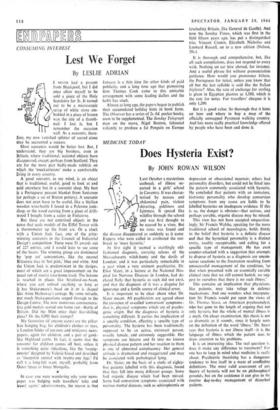MEDICINE TODAY
Does Hysteria Exist?
By JOHN ROWAN WILSON LAST October a mysterious outbreak of illness oc- curred in a girls' school in Coventry. It was charac- terised by nausea and
At first sight it seemed a startlingly old- fashioned diagnosis, carrying echoes of the Massachusetts witch-hunts and the devils of Loudun; and it was particularly remarkable in a year when a very eminent psychiatrist, Dr. Eliot Slater, in a lecture at the National Hos- pital for Nervous Diseases in London, had de- clared flatly that hysteria as such did not exist, and that the diagnosis of it was a disguise for ignorance and a fertile source of clinical error.
It is important to be clear about what Dr. Slater meant. All psychiatrists are agreed about the existence of so-called `conversion' symptoms: that is, physical symptoms which are of psycho- genic origin. But the diagnosis of hysteria is something different. It carries the implication of a specific condition, affecting a specific type of personality. The hysteric has been traditionally supposed to be an active, extrovert person, usually female, and extremely suggestible. Her symptoms are bizarre and fit into no known physical disease pattern and her reaction to them is one of abnormal complacency. Her general attitude is dramatised and exaggerated and may be associated with pathological lying.
Dr. Slater, on the basis of a study of eighty- five patients labelled with this diagnosis, found that they fell into many different groups. Some had organic disease which had been missed. Some had conversion symptoms associated with various mental diseases, such as schizophrenia or
depression or obsessional neurosis; others had personality disorders, but could not be fitted into the pattern commonly associated with hysteria. He concluded that patients with an immature, histrionic personality who develop conversion symptoms from any cause are liable to be labelled hysterics on inadequate evidence. If this is so, the danger is obvious—that serious, and perhaps curable, organic disease may be missed.
This view has not been accepted unquestion ingly. Sir Francis Walshe, speaking for the more traditional school of neurologists, holds firmly to the belief that hysteria is a definite disease and that the hysterical personality is a distinct. entity, readily recognisable, and calling for a specific type of management. He has even counter-attacked with a suggestion that attempts to dispose of hysteria as a diagnosis are unconr scious reactions to the frustration resulting from unsuccessful management of the condition, 'so that when presented with an essentially curable clinical state that we still cannot banish, we sug- gest to ourselves that there is no such illness.'
This contains an implication that physicians, like patients, may take refuge in defence mechanisms. And one wonders what interpreta- tion Sir Francis would put upon the views of Dr. Thomas Szasz, an American psychoanalyst, who has gone to the length of arguing that not only hysteria but the whole of mental illness is a myth. On closer examination, this thesis is not so dramatic as it sounds, since it largely rests on the definition of the word 'illness.' Dr. Szasz says that hysteria is not illness itself—it is the language of illness which the patient uses to draw attention to his problems.
It is an interesting idea. The real question is, does it make any difference to treatment? For one has to keep in mind what medicine is really about. Psychiatric theorising has a dangerous tendency to lose itself in a maze of conflicting definitions. The most valid assessment of any theory of hysteria will not be on philosophical grounds, but on the assistance it can give in the routine day-to-day management of disturbed patients.


































 Previous page
Previous page